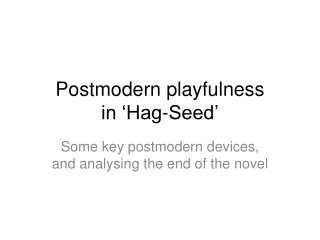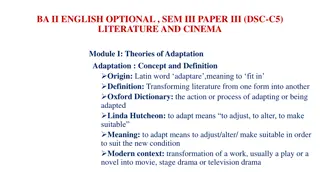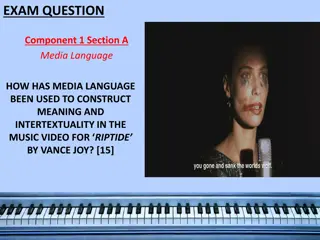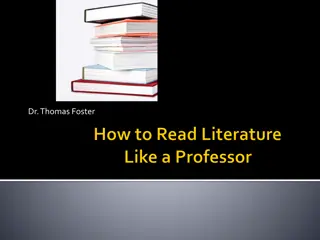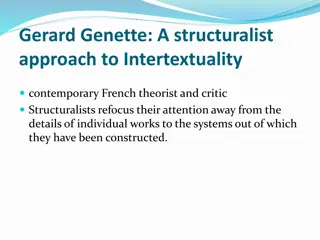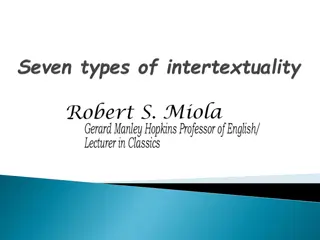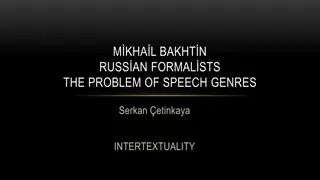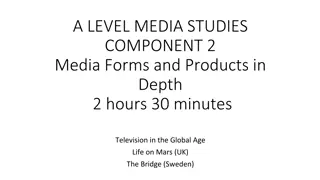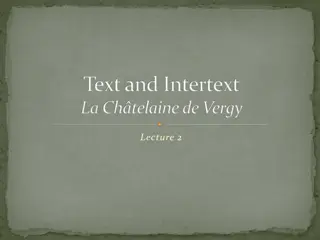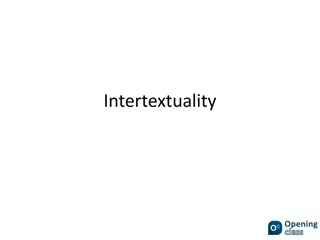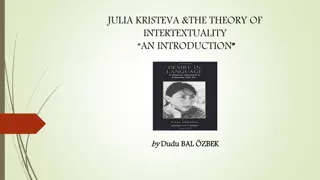Postmodern playfulness in ‘Hag - Seed’
Analyzing the use of postmodern devices and the end of the novel in Hag-Seed, with a focus on intertextuality, poioumena, and the hypothetical multiverse.
1 views • 7 slides
Theories of Adaptation in Literature and Cinema
The concept of adaptation involves transforming literature from one form to another, such as from a play or novel into a movie or television drama. Various approaches and theories of adaptation exist, including perspectives from theorists like Linda Hutcheon, Bela Balazs, and Andre Bazin. These theo
0 views • 9 slides
Deconstructing Media Language in the Music Video "Riptide" by Vance Joy
Analysis of how media language is utilized to convey meaning and intertextuality in the music video for "Riptide" by Vance Joy. The response should demonstrate a deep understanding of theoretical frameworks, providing insightful and detailed interpretations supported by relevant theories.
1 views • 14 slides
Literary Analysis Insights by Dr. Thomas Foster
Uncover insightful perspectives on literary themes such as quests, communion, vampirism, intertextuality, and common cultural references like Shakespeare and Biblical stories. Dr. Thomas Foster delves deep into the layers of meaning and connections within literature, shedding light on familiar trope
0 views • 37 slides
Understanding Gerard Genette's Structuralist Approach to Intertextuality
Explore Gerard Genette's structuralist approach to intertextuality, where he focuses on the systems and codes within which signs and texts function rather than individual works. Genette's studies on narrative discourse and transtextuality provide a deeper understanding of how texts relate to one ano
0 views • 23 slides
Understanding Intertextuality in Early Modern Literature
In Michele Marrapodi's book "Shakespeare, Italy, and Intertextuality," Miola explores various types of intertextual transactions, particularly in Shakespeare’s works. He categorizes intertextuality into seven types based on three variables, emphasizing the continuum of influence on interpreting te
0 views • 26 slides
Russian Formalism: An Overview of Speech Genres and Intertextuality
Russian Formalism, a literary theory movement that emerged in the early 20th century, viewed literature as a distinct form of language. It was characterized by a shift from romantic and symbolist traditions towards a focus on structural analysis and the study of literary systems. Mikhail Bakhtin, a
0 views • 25 slides
Analysis of Genre Elements in Life on Mars and The Bridge
Television series like Life on Mars (UK) and The Bridge (Sweden) exemplify various genre theories and narrative structures. From discussing social, cultural, economic, and political factors affecting production to exploring media language and Neale's Genre Theory, these shows showcase how genres osc
0 views • 13 slides
Exploring Intertextuality in Medieval Manuscripts
Delve into the concept of intertextuality in medieval manuscripts, focusing on the Châtelaine de Vergy. Discover how manuscript culture and mouvance shape textual mobility and authorship perceptions. Uncover key points on manuscript variations and the dynamic nature of medieval works. Critically ex
0 views • 16 slides
Exploring Literary Connections and Cultural Adaptations
Delve into the world of intertextuality, adaptation, and appropriation in literature. Discover how texts inspire new creations, symbols find new meanings in popular culture, and characters take on fresh significance. Explore traditional genres and their conventions, from classic plots to audience te
0 views • 13 slides
Julia Kristeva & the Theory of Intertextuality: An Introduction
In this introduction to Julia Kristeva's theory of intertextuality, we explore her concept of texts as intersections of various writings rather than fixed points of meaning. Kristeva argues that texts are composed of prior existences, forming a mosaic of quotations and transformations. Intertextuali
0 views • 25 slides
